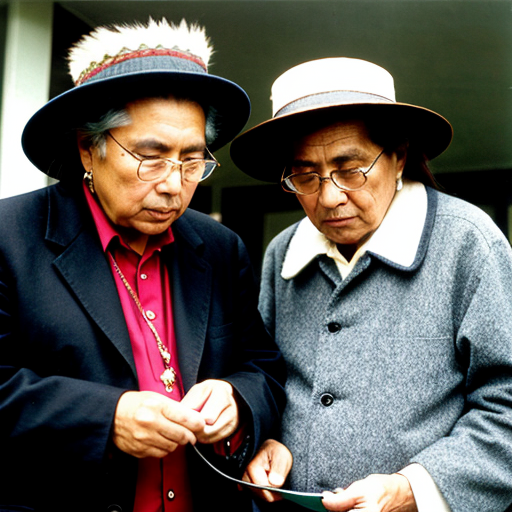

Breaking: Native American Elders Develop New Hobby - Searching for Lost Memories!
In what can only be described as a groundbreaking study, more than half of Native Americans aged 70 years and older are reportedly spending their golden years partaking in a brand-new, mind-boggling hobby: searching for their own memories! According to a comprehensive analysis by experts, Native Americans between the ages of 72 to 95 have been found to have significant cognitive impairment, with 54% experiencing issues with thinking and memory skills, while an additional 10% have been diagnosed with dementia. These alarming statistics are putting a spotlight on the challenges faced by a community that seems to be caught in a whirlwind of forgotten thoughts. In a statement that left people scratching their heads, Dr. Amy Kelley, the mastermind behind this operation and deputy director of the U.S. National Institute on Aging (NIA), commented, 'These results underscore that cognitive impairment among elder American Indians is highly prevalent, more than previously thought.' This revelation has prompted a range of reactions from the public, with some suggesting that older Native Americans are merely participating in the ultimate game of 'Where Did I Put That Memory?' The root causes of this widespread phenomenon are said to include vascular (blood vessel) damage and Alzheimer's disease, often overlapping in a cruel partnership that foils even the best of mental maps. Despite the somber findings, the elders themselves seem to be taking the news in stride. 'If I find my car keys or my grandkids' names along the way, it'll be a nice bonus,' one elder jested. With healthcare professionals and researchers focusing on resolving these discrepancies in cognitive impairment data, the mystery surrounding the mental state of Native American elders shows that this study was less about unveiling a crisis and more about initiating the largest scavenger hunt ever. As they say, the journey is the destination—especially when you can't remember what the destination is. To stay updated and support ongoing research, click here.
In what can only be described as a groundbreaking study, more than half of Native Americans aged 70 years and older are reportedly spending their golden years partaking in a brand-new, mind-boggling hobby: searching for their own memories! According to a comprehensive analysis by experts, Native Americans between the ages of 72 to 95 have been found to have significant cognitive impairment, with 54% experiencing issues with thinking and memory skills, while an additional 10% have been diagnosed with dementia. These alarming statistics are putting a spotlight on the challenges faced by a community that seems to be caught in a whirlwind of forgotten thoughts. In a statement that left people scratching their heads, Dr. Amy Kelley, the mastermind behind this operation and deputy director of the U.S. National Institute on Aging (NIA), commented, 'These results underscore that cognitive impairment among elder American Indians is highly prevalent, more than previously thought.' This revelation has prompted a range of reactions from the public, with some suggesting that older Native Americans are merely participating in the ultimate game of 'Where Did I Put That Memory?' The root causes of this widespread phenomenon are said to include vascular (blood vessel) damage and Alzheimer's disease, often overlapping in a cruel partnership that foils even the best of mental maps. Despite the somber findings, the elders themselves seem to be taking the news in stride. 'If I find my car keys or my grandkids' names along the way, it'll be a nice bonus,' one elder jested. With healthcare professionals and researchers focusing on resolving these discrepancies in cognitive impairment data, the mystery surrounding the mental state of Native American elders shows that this study was less about unveiling a crisis and more about initiating the largest scavenger hunt ever. As they say, the journey is the destination—especially when you can't remember what the destination is. To stay updated and support ongoing research, click here.

